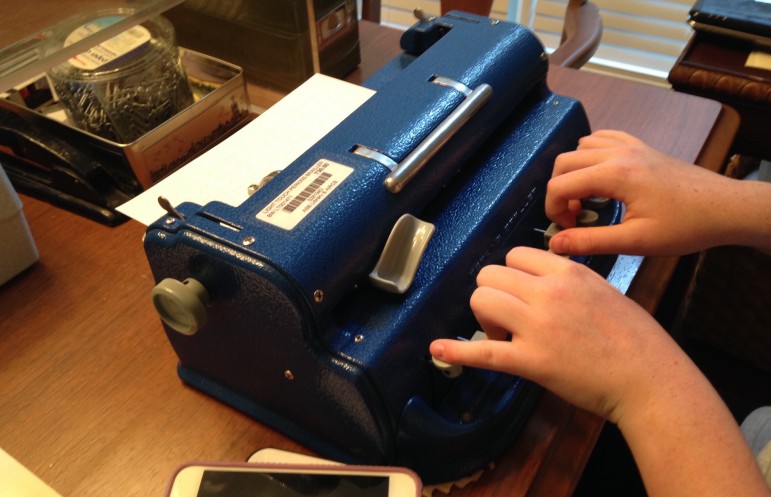Birmingham Student Puts Braille Skills to the Test
In many ways, Rachel Hyche is like any other high school freshman in North Shelby County. She plays piano and likes to sing. She loves her phone.
But the biggest difference is that Rachel is blind. She was born premature.
“I have retinopathy of prematurity, which means that my retinas have been pulled away from my eyes by scar tissue,” Rachel says. “I have light perception, but it’s pretty useless.”
As a result, Rachel learned Braille. It’s the writing system of raised dots that allows blind and visually impaired people to read. It’s also the basis of a competition this weekend in California that Rachel will participate in.
The Braille Challenge is a two-day event in Los Angeles organized by the nonprofit Braille Institute. Students compete in areas such as reading comprehension, speed, accuracy and proofreading. Rachel is one of 10 finalists in her age group.
Part of the competition will use a Braille writer. Rachel has hers set up on her family’s dining room table.
It’s looks like a shallow typewriter. It’s blue, with gray buttons, although far fewer than a regular typewriter since Braille is based on a sequence of six dots.
Rachel feeds in the thick paper. The familiar rat-a-tat rings out as Rachel presses the buttons and the machine presses dots into the sheet.

It’s Rachel’s second go around at the Braille Challenge. She was a finalists four years ago.
“I was terrified and I was also really nervous and excited,” says Rachel. “Because if I didn’t win, I would regret it for the rest of my life. I was just scared that the test would be hard and that I wouldn’t win.”
She didn’t place in the top three then, but Rachel says she’s more confident now and she’s had a lot practice with Braille.
“I want to win first place,” says Rachel.
Rachel’s mom, Kim Hyche, is nervous too, but proud. She sees the competition as a way for Rachel to build critical skills for her future.
“For Rachel to have a chance to go to California to participate in this, it’s good for her,” Hyche says. “It’s a good motivator. It pushes you to the next level.”
Braille may have helped blind people for almost 200 years but technology today, particularly text-to-speech, is raising questions of whether Braille is really as necessary. Rachel is an emphatic Braille booster. She says there are downsides to having your phone read everything. Some are aesthetic, such as the irritating computer voice. Others are practical.
“If I’m in a loud area, I can’t hear it very well,” says Rachel. “And then the whole world can hear my speech.”
In other words, there’s no privacy.
In reality, the old and new technology work in tandem. For example, with the Bluetooth device that lets Rachel navigate her iPhone through Braille.
It’s all based on the same set of skills, whether reading off a phone, typing on a Brailler, or winning a Braille competition in Southern California.
Birmingham is 3rd worst in the Southeast for ozone pollution, new report says
The American Lung Association's "State of the Air" report shows some metro areas in the Gulf States continue to have poor air quality.
Why haven’t Kansas and Alabama — among other holdouts — expanded access to Medicaid?
Only 10 states have not joined the federal program that expands Medicaid to people who are still in the "coverage gap" for health care
Once praised, settlement to help sickened BP oil spill workers leaves most with nearly nothing
Thousands of ordinary people who helped clean up after the 2010 BP oil spill in the Gulf of Mexico say they got sick. A court settlement was supposed to help compensate them, but it hasn’t turned out as expected.
Q&A: How harm reduction can help mitigate the opioid crisis
Maia Szalavitz discusses harm reduction's effectiveness against drug addiction, how punitive policies can hurt people who need pain medication and more.
The Gulf States Newsroom is hiring a Community Engagement Producer
The Gulf States Newsroom is seeking a curious, creative and collaborative professional to work with our regional team to build up engaged journalism efforts.
Gambling bills face uncertain future in the Alabama legislature
This year looked to be different for lottery and gambling legislation, which has fallen short for years in the Alabama legislature. But this week, with only a handful of meeting days left, competing House and Senate proposals were sent to a conference committee to work out differences.







